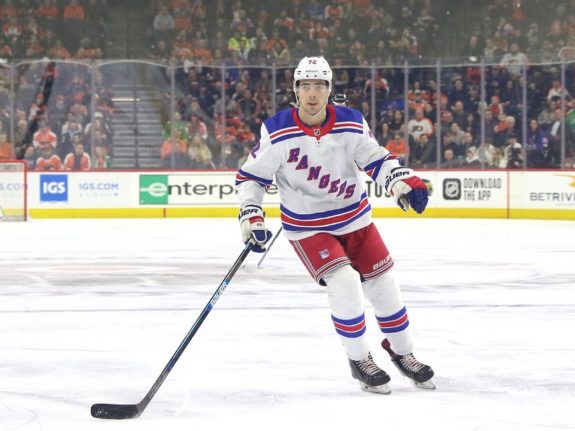A thrilling triple-overtime loss in Game 1 to the Pittsburgh Penguins saw the New York Rangers go down 1-0 in the Stanley Cup Playoffs opening round. The Rangers came out dominant, but the veteran prowess of the Penguins wound up winning out in the opening stanza of what will be a great series.
The focal point of the Penguins’ comeback and eventual victory was the dominance of their usual suspects. Led by captain and longtime foe Sidney Crosby, Pittsburgh overcame a 2-0 deficit and bested the Rangers Tuesday night. The line featuring Crosby, Jake Guentzel, and Bryan Rust was dominant, with each player factoring in on all three goals scored in regulation.

Head coach Gerard Gallant and the Rangers had no answer for the trio, who took over in the second period en route to a dominant middle 60 minutes. After a great first period, they were on their heels in the second, getting outshot 25-8 and giving up three goals in the process. Rust led the way with three points, including a power-play goal, while Guentzel had two goals and Crosby had two assists.
For a Penguins team that was stymied by the Rangers in their four regular-season meetings, they certainly figured out how to pin the Blueshirts in that second period. Despite the brilliance of that Penguins trio, the Rangers remained in the game due to their netminder Igor Shesterkin (from ‘Igor Shesterkin’s 79-save masterpiece not enough for Rangers,’ NY Post, 5/4/22). Though, if Gallant’s group wants to find a way past the Pens, they will have to shut down their top line.
Limiting the Penguins’ Offense
It was a picturesque first for the Rangers. Heavy on the forecheck, managing puck possession, and keeping the Penguins pinned in their own end for stretches at a time. You won’t keep a good team down for the entirety of a playoff game, but the effort needs to remain that way for a full 60-minutes, especially if you plan on shutting down players like Crosby and Guentzel.
The Rangers’ top line featuring Mika Zibanejad, Chris Kreider, and Frank Vatrano, seemed to be the most effective at limiting the Crosby-line’s chances. They were on the ice for the first goal, but it came after an odd-man rush and defensive scramble.
Yet, there was a commitment by Gallant to roll all four lines, something he has held true to all season, and when Penguins’ head coach Mike Sullivan continued to play the Crosby-line seemingly every other shift, Gallant failed to match up the way that he should have.
The ‘Kid Line,’ as their called, of Filip Chytil, Kaapo Kakko, and Alexis Lafreniere were completely outmatched when facing Pittsburgh’s top group. Once they started to get rolling, the Rangers took their foot off the gas and started sitting back, giving them way too much time and space to operate. There is an old saying in hockey: “The best defense is a good offense.” To stop the Penguins’ top line, that saying is of the utmost importance moving forward.

When Crosby and company are on the ice, they have to pin them in their own end and play a chippy, boring style of hockey. Limit their time and space, while holding onto possession and making them play defense rather than having them control the puck and pace. In the first, that is what the Rangers did, but in the ensuing 85 minutes, that is exactly what they failed to do.
The inexperience vs. experience factor was evident in those final 85 minutes. It was a great learning experience for the upstart Rangers, and an important lesson moving forward. To beat the Penguins or any opponent, you cannot get complacent at any point in a hockey game.
Related: 3 Rangers Players Who Need to Produce in the 2022 Playoffs
No Bad Penalties and Defensive Changes Needed
Penalties were a focal point of this hockey game. The Rangers took four penalties compared to the Penguins one. All four of them were assessed to defensemen, with Patrik Nemeth (2), Jacob Trouba, and Ryan Lindgren all being penalized. Nemeth looked outmatched when out there against the Penguins’ top-six, and one should believe Gallant will consider swapping him out for Justin Braun in Game 2.
For the momentum to stay on the Rangers’ side, they need to avoid putting Pittsburgh on the power play and work on getting their own man advantages. On the defensive side of the puck, they need to be better at tying up sticks in front, as all four of the Penguins’ goals came within a few feet of the net.
Two of the four goals were backdoor tap-ins, one was a wrist shot from in tight, and the game-winning goal was a deflection five feet in front of Shesterkin. The Rangers’ defense was too loose by their own net, a glaring issue that should be addressed and corrected in Game 2.
There is no true way to “stop” Crosby, Guentzel, and Rust, but the Blueshirts have to do a better job of containing them. If the Rangers play their game for a full 60 minutes, this series will be one they win. But if they continue to back into their own zone and allow the Penguins time and space to make plays, Crosby and his linemates will make sure that this is the last week of the Rangers’ season.
